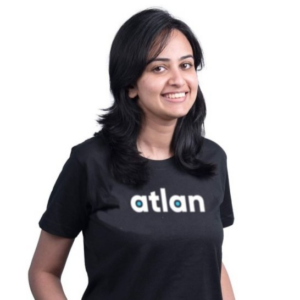Atlan Plants Itself in the Middle of the Data Governance Map with $105M Round

(ImageFlow/Shutterstock)
How did Atlan, a data catalog and data governance company that emerged during the pandemic, get to a $750 million valuation with the latest Series C round unveiled this week? The answer, according to co-founder Prukalpa Sankar, is by focusing relentlessly on tracking metadata while working openly with the broader data ecosystem.
Atlan develops data catalog and data governance tools that allow organizations to track what data they have, where it’s located, who has access to it, what they can do with it, and whether it’s meeting quality standards. The company embraced a metadata-driven approach that layers a control plane atop an organization’s “data stack” that nestles comfortably into the day-to-day tools (PowerBI, Slack, etc.) used by a broad range of personas, including data analysts, data scientists, and business folks.
The company was named a Cool Vendor in DataOps by Gartner back in 2020, and in 2022, it outscored all of its bigger competitors in Forrester’s 2022 Wave for Enterprise Data Catalogs for DataOps. It may look like an overnight success for the San Francisco, California company. But in reality, Atlan would never be where it is today without a lot of trial and error, Sankar says.
Data For Social Good
The origins of Atlan can be traced back to SocialCops, the India-based “data for social good” organization that Sankar and her colleague Varun Banka co-founded in 2012. While SocialCops had a lot of high-profile successes, such as developing a big data platform used by the prime minister of India, the organization was struggling to manage data.
“On the outside, you think ‘Cool projects,’ but on the inside, it was not,” Sankar tells Datanami.. “It was just chaos every single day.”
The organizations tried developing its own tools to no avail. It tried buying data catalog and data governance tools to get a handle on the data, but none of them panned out. But Sankar and Banka kept at it, and eventually hit on something that worked.
“The fourth time around, we got it,” she said.
Metadata For the Win
The secret sauce to the data catalog/governance tool’s success? Metadata.
“The biggest differentiation in our approach is what we call activating metadata, and taking it back into the way people already work,” she said.
The traditional approach is for each group of users to pick their own tools. So the data scientists pick their own data catalog, the business folks use something else for data governance, and the analysts have another tool for data stewardship. That doesn’t work, Sankar says.
“This leads to a proliferation of tools because all of these people have their own DNA in the way that they work, fundamentally,” she says. “And that leads to what we call chaos inside an organization.”

Atlan uses metadata to track and control data access across the big data stack (Image courtesy Atlan)
As the disparate data management tools proliferate, it becomes increasingly difficult to answer basic questions, such as “What does this number actually mean?” Trying to track down the lineage of a figure that appears in a dashboard becomes practically impossible due to the need to stitch together myriad tools used by a multitude of people, Sankar says.
“We think of ourselves as the collaboration control plane that sits on top of the data stack, and we build a unified ecosystem for the entire stack,” she says. “We’ve made a massive investment into the metadata control plane. We’re fundamentally open by design, and we’ve invested a lot into automated lineage across your entire ecosystem.”
Enterprise Success
After using the tool to complete about 200 data projects at SocialCops, Sankar and Banka decided to spin the tool out into its own standalone company.
Today the company has connectors for a wide range of data tools, including data warehouses, data lakes, databases, BI tools, ETL and ELT tools, data orchestration tools, data quality tools, message buses. Companies can scan their environment with Atlan, and the software will detect what systems are in place, and configure itself accordingly, says Sankar, who functions as a co-CEO with Banka even if they don’t formally hold that title.
“We had a customer recently that had 100 million assets across their ecosystem and we connected to it automatically,” Sankar says. “We call it governance as code, so we’re just embedded into the way that they’re already working in their tools.”
Atlan has seen its momentum has been picked up considerably over the past couple of years, with a 7X increase in revenue since 2022. The company has many of the top companies across industry verticals, including names like Autodesk, Cisco, Nasdaq, Unilever, and Zoominfo, and others.
This week’s Series C round of $105 million was led by GIC, Singapore’s sovereign wealth fund, Meritech Capital, and Salesforce Ventures. It brings the company’s total venture capital funding to $206 million.
“Atlan is setting a new standard for modern data governance, especially for enterprises with a cloud-first data strategy,” Meritech Capital co-founder Rob Ward said in a press release. “It’s increasingly viewed as the essential data control plane for major business initiatives like AI readiness and data democratization. The enthusiasm within the data community for Atlan is extraordinary, reminiscent of the most transformative companies.”
Pivot to AI
While Atlan has mostly focused on governing structured data, it the past 18 months, it has tweaked its offering to be able to govern some types of unstructured data, including text stored in object stores. It’s also managing AI models, which are data artifacts at the end of the day.
Atlan is helping customers enforce data governance policies with GenAI models, such as large language models. One customer has multiple chatbots for different use cases, such as HR or sales, and needs to make sure that the chatbots aren’t violating data access policies.
“They’re like, Okay I have this data estate. I buy data from LinkedIn. But there are terms and conditions associated with it,” she says. “My payroll data, my HR chatbot can use it. The rest of my chatbots definitely can’t use it. So how do I think about the policy of what should be used, connected to the data estate, and connected to which AI model is consuming it, or which LLM is consuming it? So we’re seeing those kinds of use cases that our customers are starting to enter.”
As companies crank up their AI investments, they’re finding their data isn’t ready for AI. That provides an opportunity for Atlan, which is keen to help them get their data house in order.
“The ecosystem is evolving and our customers are at the cutting edge of this new world that they’re moving to,” Sankar says. “AI is maybe the biggest priority inside organizations in a way that it hasn’t been in a very long time, so how do we enable them to affect the future?”
Related Items:
The Rise and Fall of Data Governance (Again)
Data Catalogs Take Center Stage in Eckerson CDO TechVent
Finding the Data Access Governance Sweet Spot


